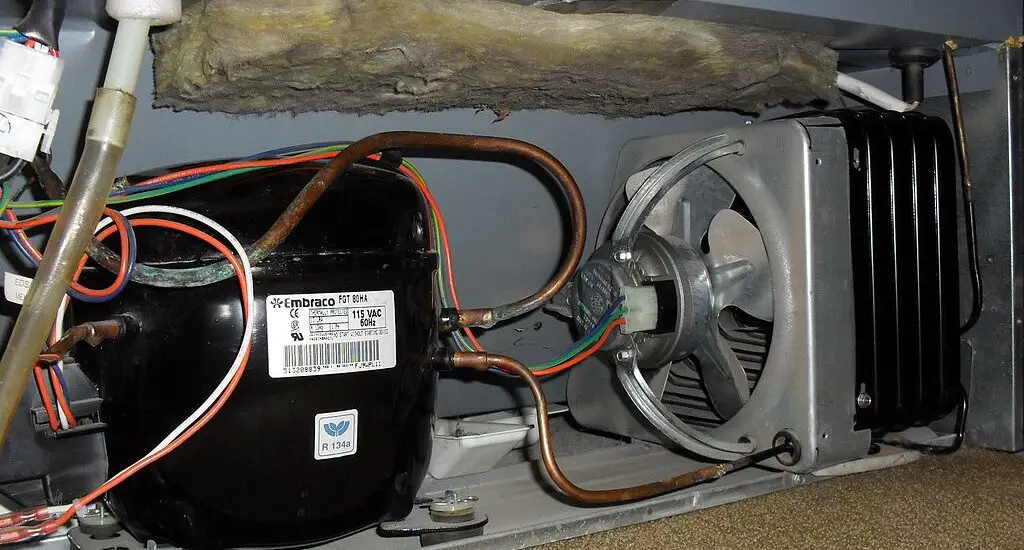Let’s get down to brass tacks about refrigerator compressor efficiency. It’s not just a clump of technical jargon – it’s what keeps your milk cold, your veggies fresh, and your energy bills in check. The better the efficiency, the better it is for your wallet and the environment. So, how about we put this under the microscope?

Table of Contents
Introduction to Refrigerator Compressor Efficiency
Imagine a heart pumping blood to keep a body alive. That’s what the compressor does for your fridge – it’s the heart of the system, circulating refrigerant and ensuring your food stays cold. And, like a healthy heart is essential for a fit body, compressor efficiency is vital for an energy-saving fridge. Pretty neat, huh?
Brief Overview of Refrigerator Compressor Efficiency
So, what exactly is fridge refrigerator compressor efficiency? In simple terms, it’s about how well your fridge’s heart – the compressor – pumps refrigerant through the cooling system. The better it performs with less energy, the more efficient it is. And, when your compressor is more efficient, you’re not just saving money; you’re also reducing your carbon footprint. It’s a bit like eating healthy food for your heart – everyone wins.
Understanding Refrigerator Compressors
Understanding compressors is like unraveling the secret life of your fridge. It’s about knowing what makes it tick, and believe me, it’s quite the adventure.
What is a Refrigerator Compressor?
A refrigerator compressor, in essence, is the fridge’s powerhouse. This little gadget takes in low-pressure, low-temperature refrigerant, works its magic, and spits out high-pressure, high-temperature refrigerant that goes on to cool your fridge. It’s a hard worker, no doubt about it!
Types of Refrigerator Compressors
Compressors come in different shapes and sizes, each with its unique style of getting the job done. It’s sort of like superheroes – they have different powers, but they all save the day.
Reciprocating Compressors
The reciprocating compressor is like the marathon runner of the compressor world. It uses pistons and cylinders to compress the refrigerant. It’s steady, reliable, and has been around the block a few times.
Rotary Compressors
Rotary compressors are speedy sprinters. They use a roller and spring setup to compress the refrigerant. They’re compact, quiet, and run like a charm.
Scroll Compressors
Finally, we have the scroll compressors – the high-jump athletes, if you will. These compressors use a unique scroll design to compress the refrigerant. They’re energy-efficient, reliable, and get top marks for performance.
Check out these other related articles…
How to Check Refrigerator Compressor Relay: A Detailed Guide
Refrigerator Compressor Jump Start: The Definitive Guide
How to Recharge Refrigerator Compressor: A Handy DIY Guide
Fridge Compressor Not Turning Off: Causes & Fixes
Oil for Refrigerator Compressor: A Comprehensive Guide
Factors Affecting Refrigerator Compressor Efficiency
Compressor efficiency isn’t magic; it’s a result of several factors playing their part, like the cast of a Broadway show. Let’s meet the stars!
Design and Materials
The design and materials of a compressor are like its DNA. They determine its strengths, weaknesses, and overall performance. Well-designed compressors using quality materials tend to be more efficient – think of it as using the right ingredients for a stellar baking recipe.
Maintenance Practices
Even the best of us need a bit of TLC, and compressors are no exception. Regular maintenance ensures they perform at their best, just like taking your car for a regular check-up keeps it running smoothly.
Refrigerator Usage and Load
How you use your fridge and how much you stuff into it can also affect compressor efficiency. It’s a bit like traffic – the heavier it is, the harder your car engine has to work.
Environmental Conditions
The environment around your fridge can influence compressor efficiency too. For instance, a fridge in a hot room has to work harder to keep things cool. Think about it – you wouldn’t go running in a park at midday in summer, would you?
Improving Refrigerator Compressor Efficiency
Compressor efficiency isn’t set in stone. You can tweak a few things here and there to get more bang for your buck. It’s like fine-tuning a musical instrument to get the best sound.
Best Practices in Maintenance
Maintaining your fridge isn’t rocket science, but it’s crucial. Regular check-ups, cleaning, and minor fixes can keep your compressor humming happily. It’s like brushing your teeth – it keeps cavities away and your dentist happy.
Optimized Usage
Being mindful of how you use your fridge can help optimize compressor efficiency. Not overloading the fridge, ensuring the door is sealed properly – small habits can make a big difference, kind of like turning off the lights when you leave a room.
Making the Right Choice: Energy-Efficient Models
When it comes to compressors, not all are created equal. Some models are designed to be more energy efficient than others. So, do your homework before you buy – it’s like reading reviews before you pick a movie to watch.
Measurement and Regulation of Refrigerator Compressor Efficiency
Measuring compressor efficiency isn’t as simple as reading a thermometer, but it’s crucial. There are tools and regulations that help keep things on track, like a referee in a soccer match.
How to Measure Refrigerator Compressor Efficiency
Compressor efficiency is measured using a few parameters – power consumption, cooling capacity, and the Coefficient of Performance (COP). It’s like a report card for your fridge’s compressor.
Regulations Governing Refrigerator Compressor Efficiency
There are rules in the game of compressor efficiency too. Various bodies, like the Department of Energy in the US, set standards to ensure compressors do their job without guzzling energy. They’re the guardians of energy efficiency, so to speak.
By now, you’re pretty much a pro on fridge refrigerator compressor efficiency. You know what it is, why it matters, and how you can make it work for you. Now, doesn’t that make you feel like a fridge whisperer?